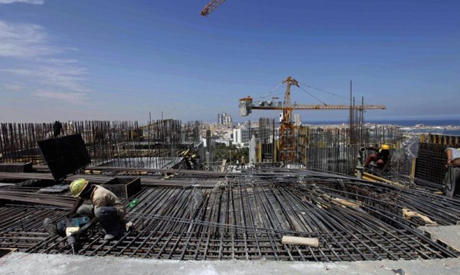
Workers from Egypt in the construction of a hotel (Photo: Reuters)
The International Monetary Fund said the Egyptian economy has begun to recover on back of structural reforms, and urged the government to employ a more flexible exchange rate to boost investment.
Government policies, including subsidy cuts and regulatory and administrative reforms, are starting to produce a "turnaround in economic activity and investment," said Chris Jarvis, the IMF's mission chief in Cairo.
The IMF expects the economy to grow 3.8 percent in the fiscal year ending 30 June.
“This is a moment of opportunity for Egypt. The economy has begun to recover after four years of slow activity," Jarvis said at the conclusion of an IMF consultation mission to Cairo. "Equally important, there is growing national consensus on the need for economic reform."
Egypt's economy has been hit by political instability and militant violence since a 2011 popular uprising ousted president Hosni Mubarak. It grew by 2.2 percent in the fiscal year which ended 30 June, just below the population's growth rate.
The IMF expressed concern about the tight control over the Pound which contributed to the formation of a foreign currency black market. The gap between the official and black market exchange rates of the pound against the dollar is about 9 percent.
"A more flexible exchange rate policy focused on achieving a market-clearing rate and avoiding real appreciation would improve the availability of foreign exchange, strengthen competitiveness, support exports and tourism, and attract foreign direct investment," Jarvis said.
Subsidy Reform
The international lender also praised Egypt's recent subsidy cuts.
“Energy sector reforms and sizeable investments will be critical to reduce energy supply bottlenecks and raise potential growth," Jarvis said.
President Abdel-Fattah El-Sisi raised fuel prices by up to 78 percent last summer in a bid to reign in the budget deficit which reached 12.8 percent of GDP in the last fiscal year. The government also announced plans to reform laws and regulations governing investment by the end of 2014.
The IMF forecast budget deficit to reach about 11 percent of GDP in the current fiscal year. "In 2015/16, it will be important to keep expenditure in check, including through continued subsidies reform to reduce the budget deficit below 10 percent of GDP," according to Jarvis.
The proposed increases in government spending on health and education are expected to protect the poor and support long term growth, Jarvis said.
Egypt's constitution commits the state to spending a minimum of three percent of national income on public healthcare and six percent on education and one percent on scientific research. Spending on health grew by 26.5 percent and on education by 13 percent in the 2014/15 fiscal year.
Following the uprising in 2011, Egypt entered into several rounds of negotiations with the IMF to get a $4.8 billion loan, but it never materialised. After the ouster of president Mohamed Morsi in July 2013, oil rich gulf countries granted Egypt $10.6 billion in cash and oil products, relieving the need for an IMF facility.
"The authorities are also seeking to improve Egypt’s external position, though additional external financing will still be needed through the medium term," Jarvis said.
Short link: